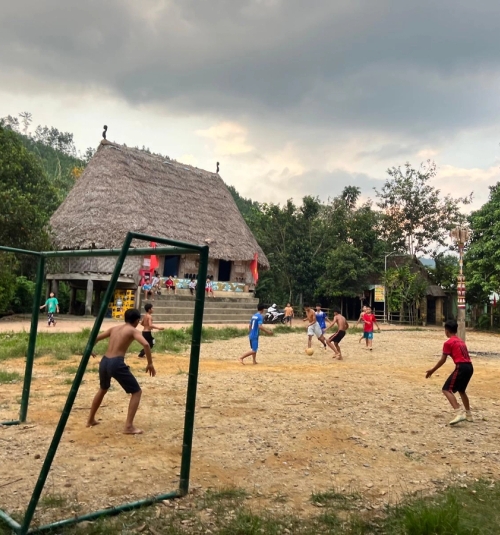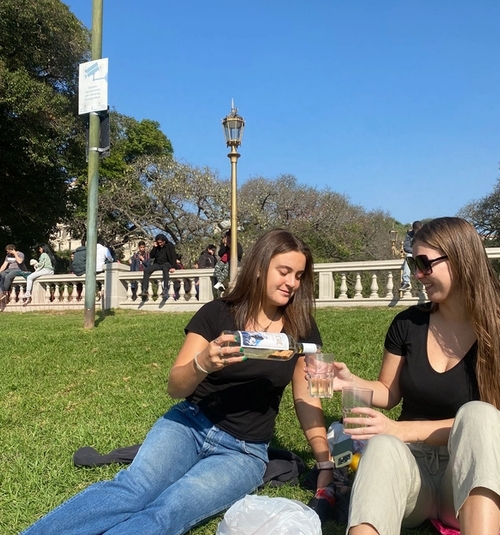
Den særegne spansken i Buenos Aires
Innbyggerne i havnebyen Buenos Aires kalles porteños. For å akselerere prosessen med å lære seg den porteño måten å snakke spansk på, finnes det noen ord du enkelt kan legge til i ditt daglige vokabular for å høres mer ut som en innfødt.

Denne teksten er oversatt ved hjelp av kunstig intelligens.
Se den originale versjonen av artikkelen her.Det vil si, du må lære deg litt italiensk, forstå omorganiserte hemmelige ord og legge til noe kroppsspråk (forestill deg den vibrerende, irriterte italienske neven).
Det utsøkte porteño-spanske språket, som jeg virkelig prøver å tilegne meg, kjennetegnes ved sitt italienske lydsystem og Lunfardo-slangen, som består av italienske ord introdusert av italienske innvandrere som bosatte seg i Argentina mellom 1880 og 1920.
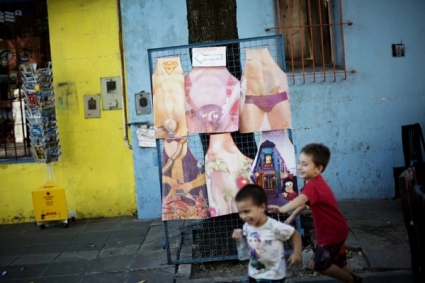
De fleste av disse immigrantene kom fra Lombardia-regionen i det nordvestlige Italia, og som et resultat dukket navnet Lunfardo opp. I dag har opptil 60 % av Argentinas befolkning italienske røtter og etternavn.
Faktisk er argentinerne "italienere som snakker spansk og tror de er britiske», ifølge en av de 33 statsoverhodene som måtte vente på en forferdelig forsinket president Carlos Menem fra Argentina for en offisiell fotoseanse i Chile på 90-tallet.

Senere ble innvandrerslangen populær etter å ha dukket opp i tangoens tekster. For eksempel, når porteños i dag diskuterer det beste pizza- (zapi på vesre/revés), ravioli- eller iskremstedet i byen, kan de bruke ord som birra, garpar, vos (i stedet for tú – du), mango, morfar eller chau (ikke det spanske ordet ciao).
Videre kan denne slangen ha forårsaket utvalget av ord for politi, som består av el vigilante, un botón, la cana, rati, poli og yuta. Ord for fest varierer fra partusa, festichola, milonga, parranda, joda, bailongo, juerga, pachanga til asalto (overraskelsesfest).
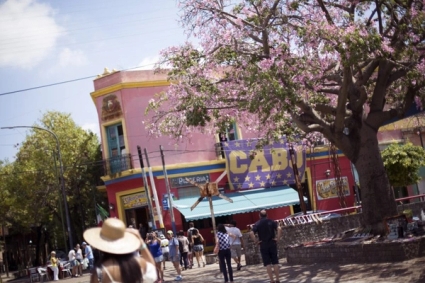
Forhåpentligvis vil denne listen hjelpe deg på veien til å snakke som en porteño, du også.
Arbolito – en person som veksler dollarene dine til argentinske pesos på gaten.
- En el calle Florida vas a encontrar un monton de arbolitos que disimuladamente te cambian tus dolares.
Atorrante – en lat person som ikke vil jobbe.
- Sos flor de atorrante!
Bárbaro – selv om bárbaro brukes som barbarisk i andre spansktalende land, betyr det “super fint” i Argentina.
- – Nos encontrámos ahí a las seis?
- – Bárbaro!
Birra – ren italiensk som betyr øl.
- Me traes una birra, por favor?
Bondi – bybussen, brukt som det spanske ordet «colectivo».
- Tomá el bondi numero 100 que te lleva a mi casa.
Boliche – opprinnelig brukt for små barer, men nå om dagen ordet for nattklubber, som ikke åpner før klokken 2 om morgenen.
- Les recomiendo ir al Boliche de Roberto y pasar una noche eschuchando tango en vivo.
Buena onda – kul eller bra.
- La profesora es buena onda.
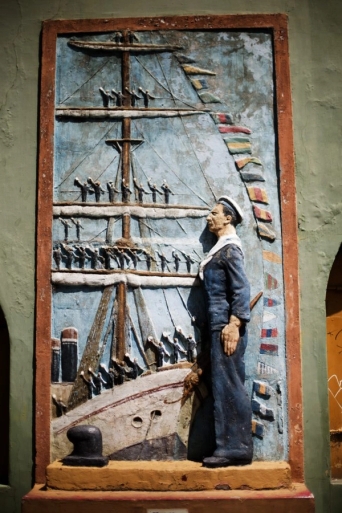
Boluda/o – en hyggelig eller slu måte å navngi en venn på, men kan også brukes som et skjellsord eller for å navngi en ubehagelig person.
- No seas boludo, no me vuelvas a gritar.
- Boluda, deja tu celular, que estamos comiendo.
Che – en form for navn man bruker når man snakker til noen, enten brukt som “venn” eller “kompis”, eller som “hei”. Gjort berømt etter argentineren Ernesto “Che” Guevara, som ofte ble kalt Che. De argentinske urfolksstammene Tehuelche, Pehelche og Mapuche (alle ender med che) bruker che for å bety “mann” eller “folk”.
- Che, me pasas un mate?
Churro – dette er en frityrstekt bakverk som vanligvis har dulce de leche inni, men brukes for å si at noen ser bra ut.
- El hombre con el sombrero es un churro total.
Curtir – å få erfaring, også på den harde måten.
- Si no la entendiste, curtite!
Cómo andamio? – som betyr hvordan har du det, der andamio bokstavelig talt betyr stige. Det følgende svaret er et ordspill for 'alt bra, og du'
- – Cómo andamio?
– Todo viento, y Bosta?
Chabón – dude/fyr.
- No me rompás más los huevos, chabón.
Engrupir – å lure noen, kan hende avledet fra det italienske ordet ingroppare som betyr «å knulle».
- El chabón la engrupió como quinceañera.
Fiaca – En lat person eller latskap, som kommer fra det italienske ordet “fiacca – latskap”.
- Que fiaca que sos!
- Que fiaca que tengo.
Feca – kafé.
- Me fui con la nami a tomar un feca.
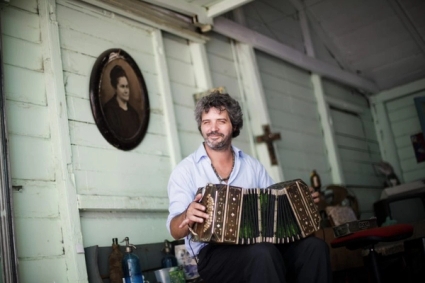
Garca – det omvendte av verbet cagar som betyr «å drite på» eller «ikke bry seg om».
- El garca se quedo con toda la plata.
Garpar – å betale, kommer fra det omvendte ordspillet av det spanske ordet pagar.
- La mujer me dejo garpando en el feca.
Gaucho – cowboyene i Argentina som stammer fra “cauchu” som betyr vandrer på mapuche (innfødt gruppe)
- El gaucho típico anda a caballo.
Groso – et ord for å beskrive en virkelig stor person.
- Vos tocás la batería muy bien, sos un groso.
Junar – kommer fra caló-språket som snakkes av spanske og portugisiske romani, og deres ord «junar» som betyr å høre.
- No te juno, pirá de acá.
Joya – utmerket, perfekt.
- Vamos al cine?
– Joya!
Laburar – å arbeide, kommer fra det italienske ordet “lavorare” som betyr “å arbeide” og brukes ofte på samme måte som det spanske ordet “trabajar”.
- Voy a tirar una onda y laburar con los pibes un rato.
La posta – den eneste sannheten.
- Me tiras la posta, chábon.
Luca – 1000 mangoer eller pesos.
- El auto cuesta cien lucas.
Mango – penger, som stammer fra tiden da en mango kostet en peso.
- Le cuesta 100 mangos.
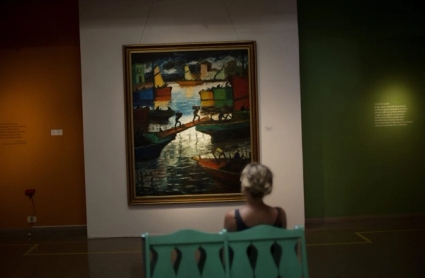
Maza – fantastisk, fra kølle eller slegge.
- Tu dibujo es una maza.
Mina – jente, et uformelt ord for kvinne som kommer fra det italienske ordet “femmina”.
- La mina es un bombon.
Motorsykkeltyv – en tyv på motorsykkel.
- Ojo, hay motochorros en esa zona!
Morfar – å spise, fra det franske ordet morfor som betyr “å spise”.
- Me preparás un asado para morfar.
Ñoqui – a person employed as a worker by the government, but doesn’t need to do any work for the wage. The monthly paychecks are given at the 29th day of every month and traditionally celebrated with eating gnocchis. The term comes from the epidemic of ghost employment of the 1970s.
- Es 29. apareció el ñoqui.
O sea – som i 'eller' eller 'jeg mener', kan også bli overbrukt som i den engelske versjonen.
- Me encantaría ir a la feria, o sea que, tipo, tendrías que dejar la computadora.
Pibe – barn eller ung mann som kommer fra de italienske ordene “pivello” eller “pivetto” som betyr “barn”.
- Los pibes se fueron a la playa.
Pelotudo – en tåpe, kommer fra pelotas, baller (noen med store baller). Det har strengere implikasjoner enn “boludo”.
- El politico corrupto es un pelotudo de mierda, o sea, no me gustan los politicos.
Quilombo – Et totalt kaos eller en katastrofe. Ordet stammer fra et samlingssted for slaver i Brasil, og ble deretter tilpasset i Argentina med betydningen “bordell”.
- Los pibes hicieron una partuza en el depto y dejaron un quilombo.
Re og recontra – prefiks som betyr veldig eller ekstremt.
- Me recontra gustó las flores que me tragiste, son re-lindas.
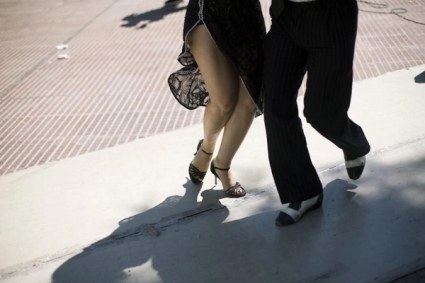
Salute a tutti – Hilsener til alle, fra italiensk “salute” – skål.
- Vas al campo con tus amigos? Salute a tutti!
Tano – En person fra Italia, en forkortelse for Italiensk og ofte brukt som kallenavn på en person med italienske røtter (det er også helt greit å kalle din lubne venn for gorda – tjukkas, din kinesiske venn for Chino og din argentinske venn med mørkt hår for negro).
- Vamos a buscar al tano y sigumos de juerga.
Telo – et ord for hotell, men en type hotell som kun brukes til seksuelle aktiviteter.
- Hoy pasamos un telo en camino al parque y entramos de una.
Trucho – fake, fra gammel spansk slang "truchamán" fra arabisk “turheman”, som betyr oversetter, en person som lurer turister i turistfeller.
- Me vendieron un celular trucho.
Tordo – omvendt ord for lege.
- Me sentía tan enfermo que tuve que ir a visitar el tordo.
Yeta – uflaks, fra italiensk iettatore.
- Que yeta tuve anoche con la nami! (word play for mina – girl)
Zafar – når noe nesten skjedde eller for å komme seg ut av et sted.
- Zafe que el auto me hiciéria mierda.
- Zafá de aca! (get out of here)
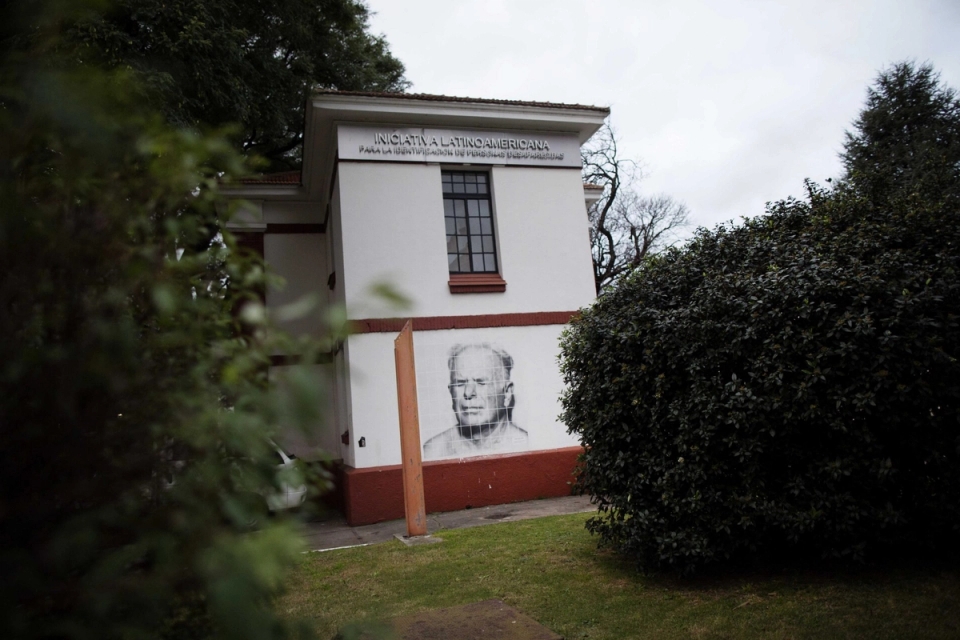
——————–
A los pedos – å gå veldig fort.
- Ando mi bicilecta a los pedos cada día.
Al pedo – å gjøre ingenting.
- Estar en Facebook durante cuatro horas es estar al pedo.
En pedo – å være veldig full
- Ella su puso en pedo anoche.
Cagar a pedos – å irettesette noen eller finne feil ved
- El otro día me mande una cagada, y me cagaron a pedos.
De pedo – Noe gjort ved flaks, ved en tilfeldighet.
- Casi no quedaba yerba, nos tomamos un mate de pedo.
Del año del pedo - kjempegammel
- Me compré una máquina de fotos del año del pedo.
Ni en pedo – som betyr «på ingen måte». Du ville ikke engang gjort det om du var full – «på bærtur».
- Ni en pedo que me voy a comer choripan solamente, mientras que esté en Baires.
Pedorro – noe dårlig av dårlig kvalitet.
- Llagamos a los pedos y había una comida pedorra, ni en pedo la como.


